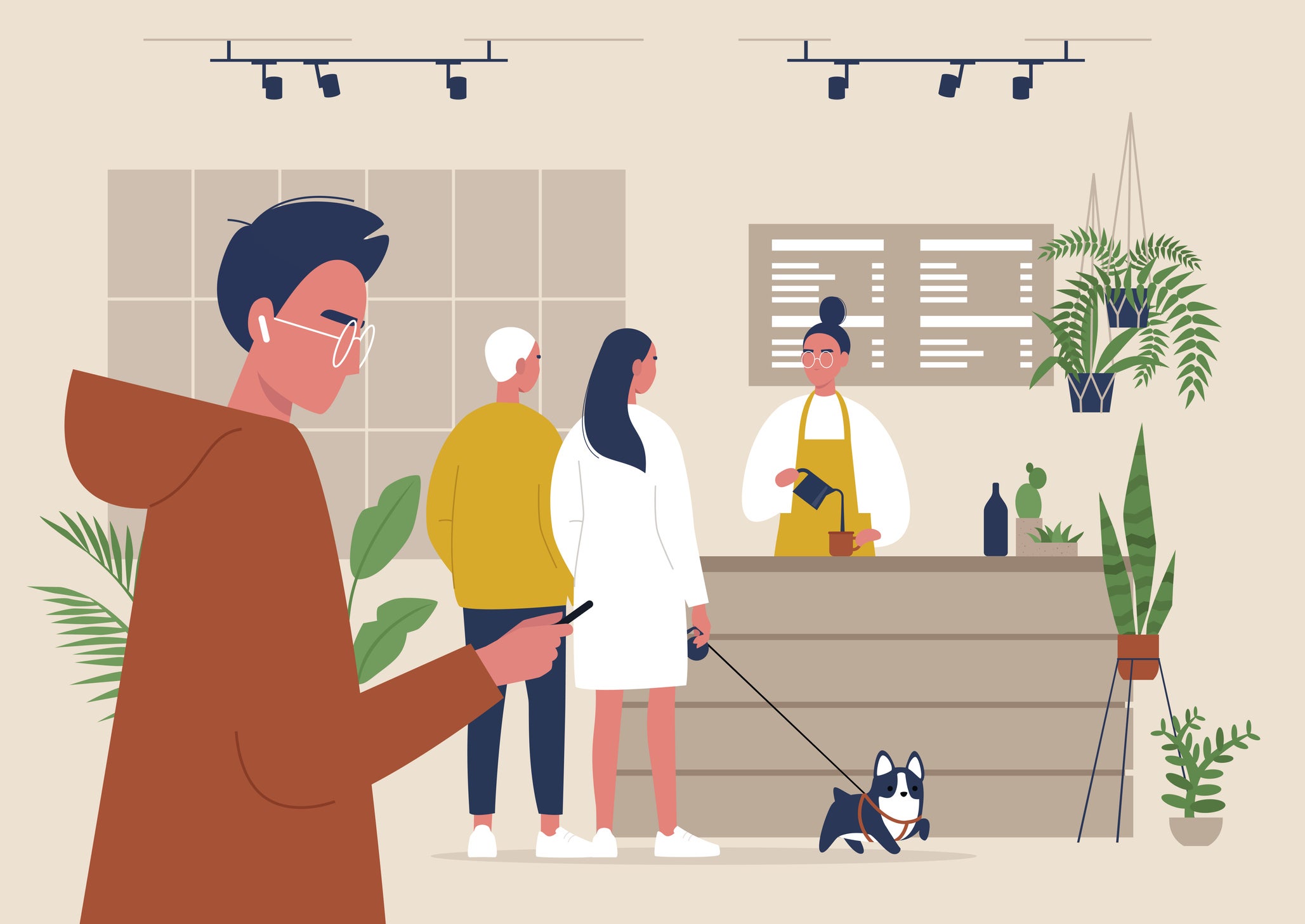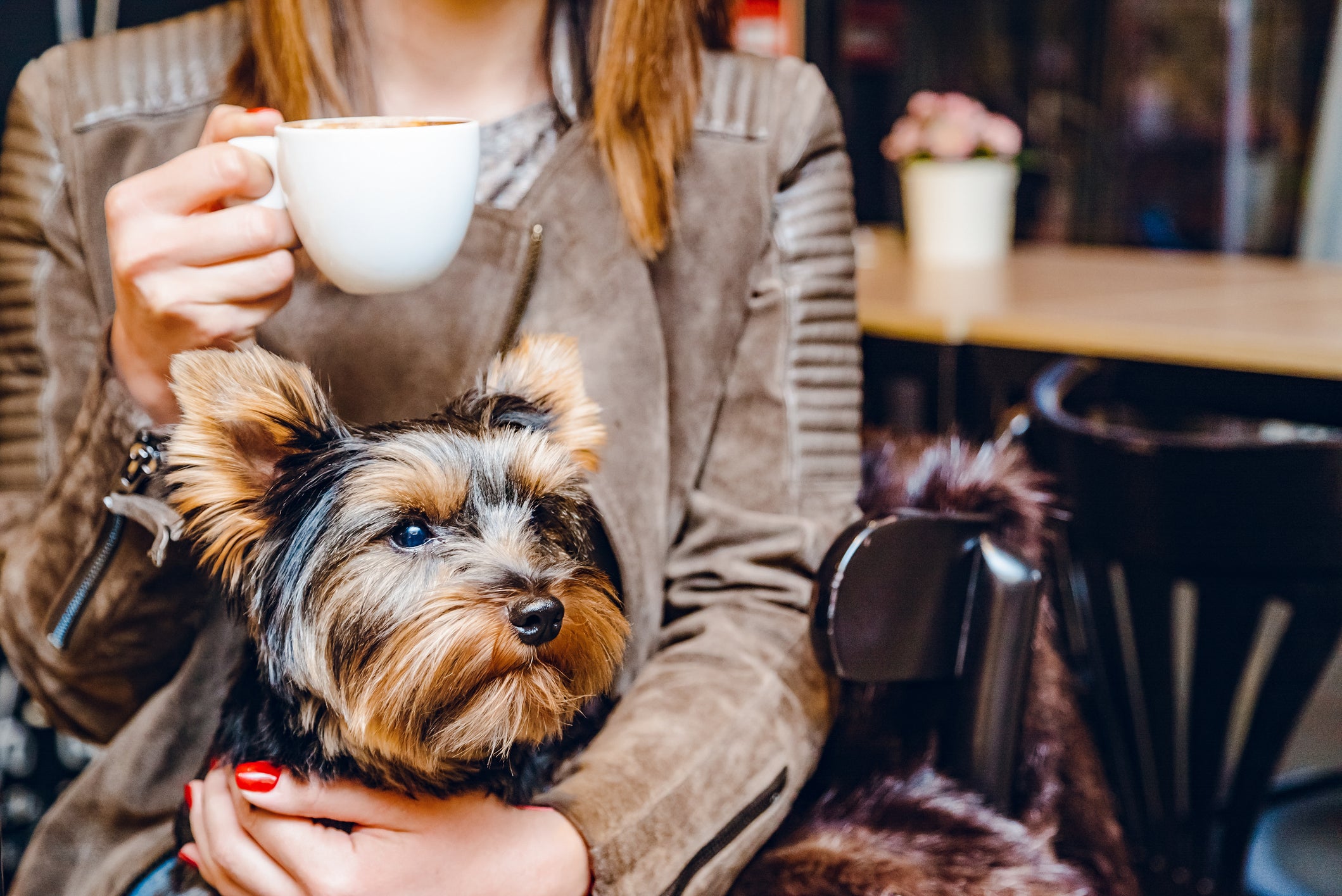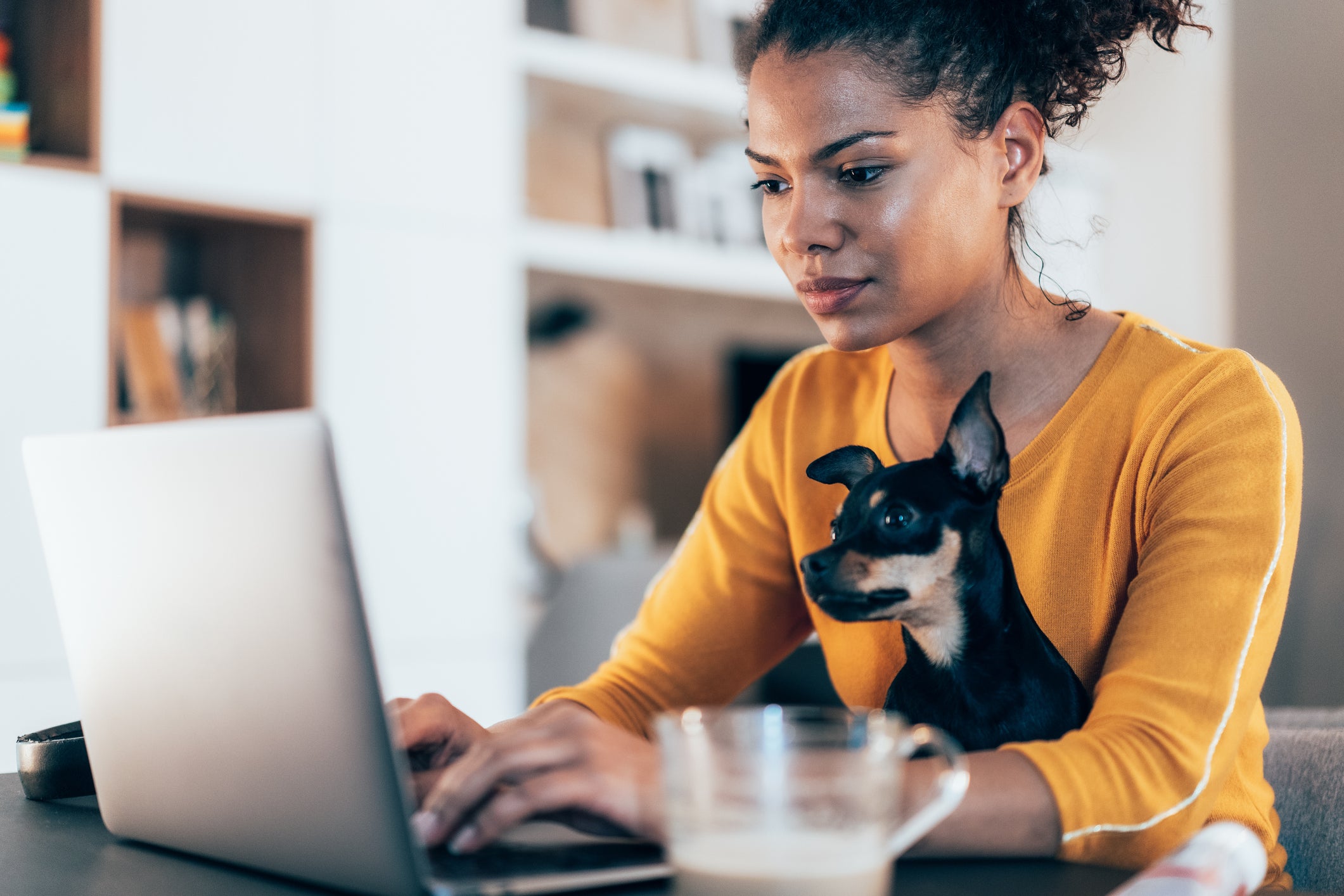The Independent's journalism is supported by our readers. When you purchase through links on our site, we may earn commission.
In the dog house: How to make room for man’s best friend as we return to normality
As normal life resumes, Kate Leaver asks how the world is adapting to allow our new four-legged friends to join us


My dog, Bert, is rarely happier than when he’s on the Tube. To him, it’s simply a moving box of potential admirers. He makes his way through the carriage, accepting pats and compliments and posing for photos. In return, he provides a little moment of joy to beleaguered commuters who are questioning the life decisions that led to their smelling a stranger’s armpit each morning on the way to work. It’s a sweet, wholesome interaction and I wish it were possible in every public place. Not to mention, I am so powerfully fond of him, I’d really like to be able to take him everywhere. Eighty-five per cent of dogs have shown signs of separation anxiety when their people leave – and I am afflicted with the very same when I spend time apart from my four-legged best mate.
There are nearly 10 million pet dogs in the UK. Two million people welcomed one into their homes during lockdown, all of whom are wondering what to do now that offices are opening and parts of our lives have resumed where dogs are not always invited. Twenty-three million Americans got a pandemic pup. Many of them without a great deal of thought for what might happen when we ventured outside the home regularly again. And now shelters across the world are overwhelmed with new arrivals, as people abandon the hairy little housemates who brought them such comfort over the past year. While it’s always the right thing to do, taking a animal to a rescue shelter rather than abandoning or neglecting them, it’s also devastating to hear of so many excitedly bought and then regretfully discarded animals.
One potential solution is to make it easier for people to integrate their pets into their everyday lives. If only our darling mutts were allowed to accompany us into the office, to curl up under tables at restaurants, totter along beside us on shopping trips, dutifully trot along the aisles at supermarkets, and maybe even join us on a cheeky visit to an art gallery. That would also significantly decrease the horrific deaths of animals left in overheating vehicles and the theft of pets left tied up outside buildings. If we adopted a broader policy of tolerance to our canine companions, we’d be able to keep them safer too.

Of course there are considerations. People with allergies, reasonable objections or cultural sensitivities shouldn’t be made to share a space with an animal. Anyone who brings a dog to a public place, especially a workplace, should take proper precautions to ensure their pup is polite and considerate. Dogs should be well-behaved and probably not, like my previous dog – the late Lady Fluffington (RIP) – make eye contact with the CEO of your company while leaving an enormous trail of urine on the boardroom floor.
That embarrassing moment aside, most dogs are more hygienic than you’d expect and often make better co-workers than people, in my opinion. Therapy dogs have had outstanding success providing comfort and emotional support in hospital environments, emergency departments, children’s hospices, special needs schools and courtrooms. It’s actually not an outlandish suggestion that Susan from HR update the office policies to include dogs, or for Sainsbury’s security guards to wave you in smilingly when you turn up with your hound.
Dr Deborah Wells, psychologist and director of the Animal Behaviour Centre at Queen’s University Belfast, endorses my suggestion that Bert and his canine peers be allowed almost anywhere they’d like. “Dogs have the potential to bring enormous physical and psychological benefits to their owners outside the home environment,” she says. “Research points to a calming effect of both stroking, and being in the mere presence, of one’s dog, with the animal helping to lower heart rate, blood pressure and improve the release of ‘feel-good’ neurotransmitters.
Research points to a calming effect of both stroking, and being in the mere presence, of one’s dog
“The non-judgemental presence of an animal also has the potential to improve cognitive performance and buffer people from stress, something that might be of value in the challenging context of the workplace. People with an anxious disposition, hidden disability or those who simply cannot bear leaving their pet at home may gain particular benefits from having their dog at work, bearing in mind some of the logistical challenges that can come with doing so.”
I know first-hand how powerfully comforting a dog’s company can be. I wrote all about Bert’s capacity to support me through depression in my book, Good Dog, and asked countless canine experts and dog fans to back me up with scientific proof and their own lived experience. I have also just recorded the first season of a podcast called Who’s A Good Dog, for which I spoke to celebrities and cultural thinkers about the goodness of dogs. They’d all unanimously support the presence of dogs in public places, I think.

Author Juno Dawson told me that her precious chihuahua Prince sits in the front row when she speaks at literary festivals. TV presenter Tony Robinson said he’d think of making a documentary about the uniquely special relationship between dogs and people. Journalist Zing Tsjeng told me how impeccably behaved her rescue dog Judy was on a photo shoot for Time Out London with drag race star Bimini Bon Boulash. It is entirely possible for dogs to behave themselves in public places and I reckon we should give them a chance.
Nathalie Ingham, canine behaviourist and training manager at Battersea (Bert’s former home), says we just need to have common sense and respect when we take our dogs anywhere with us. “It’s great when you can take your dog along to different venues if this is something that your dog enjoys, but it’s really important to ensure that – as owners – we are responsible and respectful of others sharing the spaces, too.” She recommends keeping your dog on a lead, teaching them to be obedient, and building up their experience of places outside the home so that they feel confident in new settings.
In an ideal world, we would like to see more public places become dog friendly as this will have a positive impact on dog welfare
“Training your dog helps build a good relationship and encourages dogs to seek guidance from you in situations where they might struggle. Our website has lots of information on how to train your dog and teach them useful skills for all these situations such as loose lead walking or how to settle.” And that’s actually what it comes down to, mostly: good relationships. Between dogs and their human mates, yes, but also just person to person. If someone is scared of your dog, respond respectfully and take the dog away. If your dog is too noisy to behave appropriately in a workplace, make other arrangements. It’s not complicated. But I do think the science-backed loveliness of being near a dog makes a compelling case for allowing them to keep us company in more locations.
It’s not just me, as I say. Dogs Trust is behind me on this one, too. A spokesperson told me that: “In an ideal world, we would like to see more public places become dog friendly as this will have a positive impact on dog welfare – especially following the boom in pet ownership during the pandemic. In recent years there have been steps taken in the right direction, with more major high street shops now allowing dogs on their premises, but we feel more could be done.” More to be done, like broaching dog-friendly policies wherever appropriate. Starting, probably, with our places of work.

“Dogs can be a wonderful addition to a working environment, providing the correct provisions are in place to ensure this doesn’t compromise their welfare at all. It is important to consider the practical elements of having a dog in the office with your employer and other colleagues. A comfortable, quiet place for your dog to relax, a water bowl nearby and regular walks and attention are all essential to factor in, along with planning around your daily commute and schedule. If we want more places to become dog friendly, it’s also important for all dog owners to make sure their dog’s etiquette is up to scratch.” That includes cleanliness, tolerable noise levels, and generally nice manners. But it also means sensible dog ownership behaviour from people, like keeping dogs on leads, knowing to look for signs of anxiety in them, taking provisions, and researching a place before you turn up so that you can plan properly.
If I may say so, Bert is a great ambassador for my dog-friendly agenda. He sleeps curled up at my feet while I work, snoring softly and tenderly placing his paw on my knee if he needs my attention. He barks at me on the dot of 6pm each night, preventing me from working outside reasonable hours. He comforts me when I feel hopeless or sad. He requires a daily walk outside and at least one session of playing with his disgusting, well-loved toys, which cheers me up and gets me moving. He is an asset to my life, both professional and personal. We could all do with more Bert in our lives.
Kate Leaver is host of a new podcast called Who’s A Good Dog, available on all podcast platforms. She is author of the book Good Dog.
Join our commenting forum
Join thought-provoking conversations, follow other Independent readers and see their replies
Comments